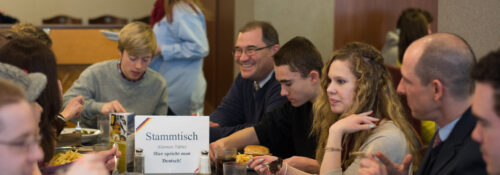
Embassies of Culture: Conversation Tables at Hillsdale
Written by Brennan Berryhill
If you walk into the cafeteria, you might see a small flag of a foreign country propped up as the centerpiece of a table. No, it’s not an embassy! But if you carry your double cheeseburger past the people there, you certainly won’t hear any English spoken. That’s because you’ve found one of the conversation tables put on by the Hillsdale language departments. Professors and students alike, with varying levels of fluency, sit down together and talk in a foreign language. Depending on the day and the hour, you might find yourself at the German Stammtisch, the Spanish Mesa de conversación, or a variety of other tables. While German, Spanish, French, and Latin are the languages that have regular weekly meeting times, it’s not uncommon to see a professor of another language, like Russian or Polish, organize a time to speak it with faculty and students.
Dr. Jared White, assistant professor of Spanish, says that the conversation table is a way to “create an opportunity for students to converse in a safe setting with sympathetic listeners.” Dr. Stephen Naumann of the German Department calls the tables “an additional immersion space outside the traditional walls of our classrooms.” Most students spend 50 minutes a day listening to a language in class, and the language tables are a way to continue and supplement learning outside of the classroom. Dr. Jan Starczewski, a French professor, says that the lunch conversations also provide a “casual setting” to talk about topics unrelated to the class and speak French with other Hillsdale students and professors.
I’ll admit that when I first learned about these tables as a Spanish 101 student, I was nervous to participate. Sitting with professors and students I hadn’t met, who all knew a lot more Spanish than I did, was extremely daunting. But once I sat at the table and practiced talking a few times, it became helpful to my learning and eventually became fun. I’m able to speak a little more each time I visit the table, and it’s exciting to understand conversations in another language—even if there are (a lot of) gaps in my knowledge.
Dr. Naumann encourages new German students to come to the table. He teaches German 101 and has so much fun on the first day of class watching students go from knowing absolutely nothing to understanding basic phrases. Even with only an hour-and-a-half of German under their belt, students are encouraged to participate at the table with what they know. Dr. Naumann understands the difficulty—he’ll go to tables of other languages he isn’t fluent in to remind himself what students are going through—but he says that the most important factor to language learning is the quantity of repetition. Speaking a language frequently gets rid of the initial embarrassment and builds your confidence. He says that students who make the conversation table a weekly habit see incredible growth. “It’s a struggle,” he says, “but we all struggle together.”
Dr. White describes conversation practice as breaking the ice between you and the language. The more you practice, the more the language becomes your friend. “It’s a wonderful thing to be able to speak someone else’s language,” he says. The importance of the endeavor can’t be overstated. You’ll often see faculty from unrelated departments come to the conversation tables to brush up on their skills, or even students who aren’t in a language class stop by. Conversations will range from basic introductions to talking about music, art, culture, philosophy, and current events. You can immerse yourself in these topics in addition to the language.
There are plenty of real-world benefits to speaking another language as well. Dr. Starczewski emphasizes the tables as a way to develop critical thinking and problem-solving skills. You’re exposed to expressions you might not learn in class, and you’ll get a broader view of culture that’s easy to miss in the Hillsdale bubble. Not to mention, knowing another language is a “major professional advantage.” Lots of careers, like international business, politics, and fashion, require you to know more than English. But even if you aren’t going into a global career, Dr. Starczewski says that employers prefer candidates who have learned another language, because of the “character, discipline, and endurance” you need to accomplish such a large task.
While other universities provide opportunities to practice language, what makes Hillsdale unique is the emphasis placed on it by the liberal arts curriculum and the bonds that form between students and teachers. Along with the conversation tables, the language departments offer tutors, film series, and myriad events to attend. Students are given opportunities to fall in love with a different language. Throughout the process, the professors are open and available to help. They want to hear you speak at the conversation tables, but that’s because they want to get to know you as well as help you learn another language.
So however much or little you know of a language, don’t be afraid to swing by one of the conversation tables! Spanish and French meet from 12:00-1:00 p.m. on Wednesdays, and German meets 11:45 a.m.-1:15 p.m. on Fridays. Goodbye, Adiós, Au revoir, and Auf Wiedersehen!
 Brennan Berryhill, ’27, hails from Denver, Colorado, and when he isn’t writing or obsessively taking notes, you can find him playing trombone, debating, or nerding out over football.
Brennan Berryhill, ’27, hails from Denver, Colorado, and when he isn’t writing or obsessively taking notes, you can find him playing trombone, debating, or nerding out over football.
Published in April 2024